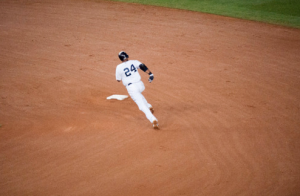 A hit is a hit is a hit is a hit. If you get on base, you’re increasing the chances for your team to score. Right? Well not necessarily. If you are a joke on the base-paths, you are doing a disservice to your team. You’re nothing more than a base-path clog in the drain leading to a run scored.
A hit is a hit is a hit is a hit. If you get on base, you’re increasing the chances for your team to score. Right? Well not necessarily. If you are a joke on the base-paths, you are doing a disservice to your team. You’re nothing more than a base-path clog in the drain leading to a run scored.Yea you may be a hitting machine, but you will be far less valuable to your line-up if you are getting thrown out at 2nd, 3rd, and home.
There are certain attributes that every baseball player should be aware of when running the basepaths. If these aren’t mastered, you are liability plain and simple.
Know what a correct lead is
The point of a lead is to get 2 things done.
- cut the distance from 1st to 2nd
- hopefully pick up the catcher’s signs
The trick is to maximize your distance from 1st while getting back safely with no exceptions. The only time you should ever be thrown out is if the pitcher has an ungodly pick off move, and you were stealing. Even then, a good coach will probably ask you “what the hell were ya thinkin?!!!”
Getting the correct distance will also allow you to get a good view of the catcher’s signals. The art of picking up signals can be very valuable and will be explained in another post.
Know the situation, be ready for what pitch is coming
The situation will always dictate the game. Meaning what choice you make between the lines will be directly influenced with the status of each inning.
If the pitcher is ahead in the count, he is probably coming with a breaking ball in the dirt. You should have already anticipated this and be ready to take second base if the opportunity presents itself.
Read balls in the dirt
This ties in directly with being aware of the situation. Being aggressive is great when a player is able to use it to their advantage. Reading the balls in the dirt will not only give you an advantage to score, but will make you look good. There is nothing more exciting to see than a player taking control of the flow of the game.
Know the pitchers tendencies and rhythm
Pitchers are creatures of habit. I would say over 50% of amateur pitchers do something that tips a pitch or shows where they are going to throw the ball.
One thing I noticed is that very rarely do college pitchers throw over to first after coming set. They seem to throw during the set process or before it but never after. All pitchers are different but they all have something that shows their next move
Know his timing
Similar to their rhythm, some pitchers- in their stretch, will pitch to home after a set time. EX: a pitcher may go to the plate every time after a count of “2 mississippi”. Becoming aware of this, you can break for second on ” 1.5 mississippi”. This will give you a major advantage so pay attention to the pitcher’s tendencies.
Master the secondary shuffle
Having a good secondary shuffle is absolutely nessasary. It gives you the required momentum while allowing you to be prepared for balls in the dirt.
Know the defense positioning
If you know the position of the defense, the better base running decisions you can make and the more aggressive you can be on the base paths.
Make the right turns/Get the right angles
You can be a guy who runs a 6.2 sixty yard dash but if you take lousy angles around the bag, you’re no faster than a guy who runs a 7 flat but takes better routes. Think about it.
Always slide
Never be the guy who gets tagged out standing up. Ever.
Going from first to third- use your instincts
While running from first, you have the whole field in front of you to make the correct decision to take third. Unless your coach tells you different, trust your instincts instead of what your third base coach may be saying.
Going from 2nd to home- pick up your third base coach
This is a bit different. You will need some guidance since the play will be developing behind you, and you should never be running with your head turned away from the direction you are running. From second, as soon as the ball is hit, pick up your third base coach.
Always hustle
This goes without saying. Trust me. A baseball career will flash by you. Don’t have any regrets.
I’m sure that you would agree with me if I were to say that extra-base hits are far more valuable than a walk or single. An extra-base hit will not only put you in scoring position but it forces the middle infield to play out of position in a sense, it applies my pressure on the defense and pitcher, and if nothing else, it puts the pitcher in the stretch.